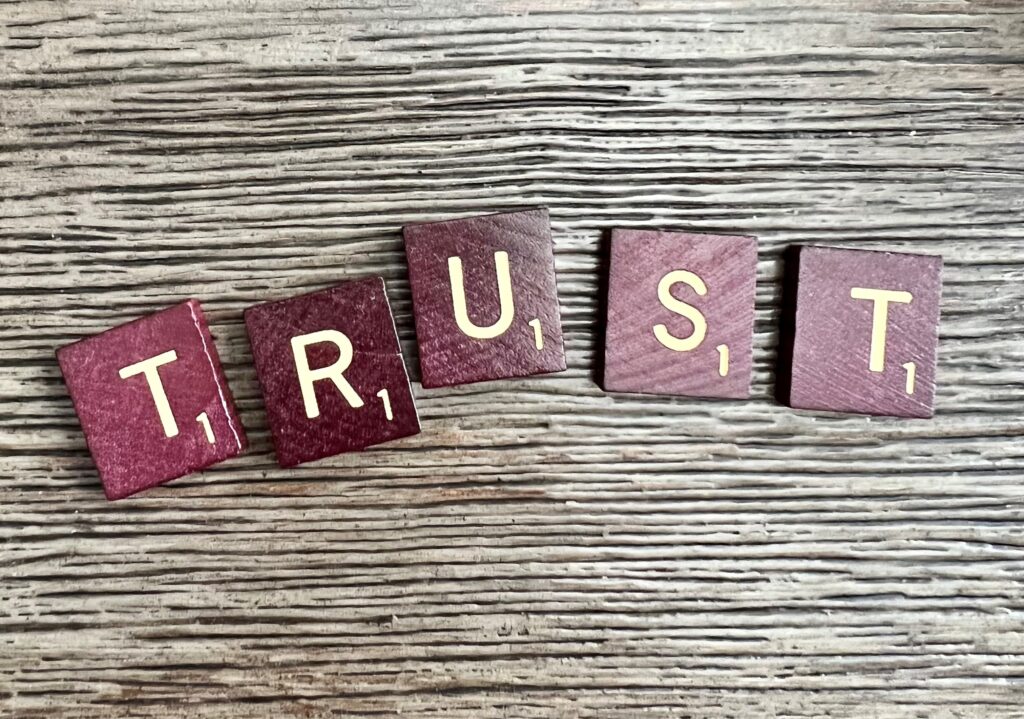Use this tool to improve trust in your relationships
“Trust is like blood pressure. It’s silent, vital to good health, and if abused it can be deadly.”
Frank Sonnenberg
Trust is essential. I think of it as the fuel that makes an organization run: it creates the conditions for individuals with different talents and personalities to come together and create something greater than the sum of its parts.
Without trust, productivity, engagement, and satisfaction suffer, and stress levels spike. It’s also foundational in client-centered work, like consulting and sales, which depends on strong relationships.
How do we create trust? What if there was an equation we could use to build it?

In this post, I’ll describe the trust equation, a straightforward tool for fostering trust in organizations
What is the trust equation?
The trust equation comes from Robert Galford, Charles Green, and David Maister’s classic book, The Trusted Advisor. While it’s tailored for a business audience, its core subject — building and maintaining relationships grounded in trust — is relevant for everyone. We’re social creatures, and trust is an adhesive that holds groups and communities together. Let’s break these components down.
The top of the equation: Credibility + Reliability + Intimacy
Credibility: do you know your stuff?
What does it mean?
In the context of the trust equation, credibility refers to the way you communicate.
In other words, it’s about understanding a domain deeply and being able to talk or write about it effectively. After all, you could be deeply knowledgeable about a subject, but if you cannot share that knowledge with others, you won’t build credibility.
How do you build more?
- This one is simple. Get the training and credentials needed to “walk the walk” in your given area.
- Operate with an awareness of what you know and what you don’t know. Credibility isn’t about having all of the answers. It’s okay to say you don’t know something and pretending to understand something you don’t can backfire and erode the trust others have in you.
- Know who in your network can lend the expertise you need, and what resources will help you respond accurately.
Reliability: do you deliver on what you say you will?
What does it mean?
Have you ever met with a sales rep who made a dazzling pitch and got you hooked, only to fail to follow up?
Reliability is all about follow-through and doing what you say you’re going to do.
It’s a simple concept, but can be challenging to implement amidst competing priorities.
How do you build more?
- Be consistent. As Kevin Plank, the founder of Under Armour says, “trust is built in drops and lost in buckets.” Being reliable is about delivering on your commitments again and again.
- You can build reliability quickly. Focus on making small, micro-commitments to your partners, stakeholders, and leaders, and build a sense of reliability by delivering.
Intimacy: do others feel safe and comfortable sharing and confiding in you?
What does it mean?
Intimacy refers to the level of emotional security people feel confiding, communicating, and collaborating with you.
The best way to create a sense of intimacy is to be honest, open, and vulnerable.

Intimacy functions like a mirror: your behavior will be reflected to you by others. When you do this, your colleagues will be inclined to reciprocate. This isn’t always easy. Vulnerability can feel deeply uncomfortable in professional settings, and we’re often inclined to keep our guard up. This can be a blocker to increasing trust in any relationship.
How do you build more?
- Be human. Own your failures and imperfections. When someone opens up, listen with attention and empathy.
- It goes without saying, but maintain confidentiality! Sharing information that isn’t yours to share destroys intimacy. Even if it doesn’t get back to the person who took you into their confidence, it shows others that you’re not trustworthy, and it will diminish the intimacy, and by extension trust, they feel with you.
- Building intimacy doesn’t mean you shouldn’t set boundaries. If someone has violated your confidentiality or made you feel unsafe, they are not entitled to your trust. It’s their responsibility to take steps to repair the relationship.
The bottom of the equation: self-orientation
What does it mean?
Self-orientation is the extent to which you align yourself with the interests of others.
People with low self-orientation are often highly valued. They are true team players, and are intentional about understanding and responding to the needs of their organizations or clients. People with high self-orientation, on the other hand, focus solely on their goals and outcomes. They tend to see decisions as zero-sum and miss opportunities for win-wins.
Having a high self-orientation is the denominator of the trust equation. The higher it is, the lower the level of trust will be. This means that you can do everything at the top of the equation right — be credible, reliable, and foster intimacy — and undermine it all with a high self-orientation.
This often explains why high performers fail to get ahead. They are more focused on their interests than the team’s interests. In a healthy organization, high self-orientation will not be rewarded.
Note that maintaining a low self-orientation does not mean sacrificing your sense of self.
The point of the trust equation is that trust is critical for your success. By earning the trust of those around you, are will be advancing your interests.
How do you lower self-orientation?
- Respect your colleagues, clients, and leaders’ time. Start and end on schedule. Make good use of meetings. Keep your answers concise; the authors of The Trusted Advisor suggest taking no more than 90 seconds to respond to a question.
- When working on a project, check in with stakeholders, peers, or clients regularly and assess how your approach is working from their perspective. This will show that you are focused on their needs and goals.
The silver bullet for building trust
Building trust takes time and effort. But there is one ingredient that can significantly accelerate the process: curiosity! This isn’t a cheap plug for the name of this site, I promise.

Curiosity is the superpower that can unlock the entire trust equation.
- Build credibility by asking informed questions and better applying your expertise.
- Foster reliability by asking clarifying questions to understand the needs of others and consistently address those needs.
- Exhibit curiosity about others on an interpersonal level and demonstrate an ability to listen and empathize.
- Reflect on and shift self-orientation by getting curious about your motives. Show others that you’re focused on them and their problems by asking thoughtful questions.
The importance of trust
So just how big of a deal is trust? What happens when we lose it or struggle to build it in the first place?
Neuroscientist and trust researcher Paul Zak has found that, when compared with people at low-trust companies, people at high-trust companies report:
- 74% less stress
- 106% more energy at work
- 50% higher productivity
- 13% fewer sick days
- 76% more engagement
- 29% more satisfaction with their lives
- 40% less burnout
Trust is an essential building block for any successful organization or relationship. At the same time, it can be hard to prioritize because it’s intangible and tricky to quantify. Nonetheless, it’s worth it. And failing to build it will almost certainly hold you and your organization back.


